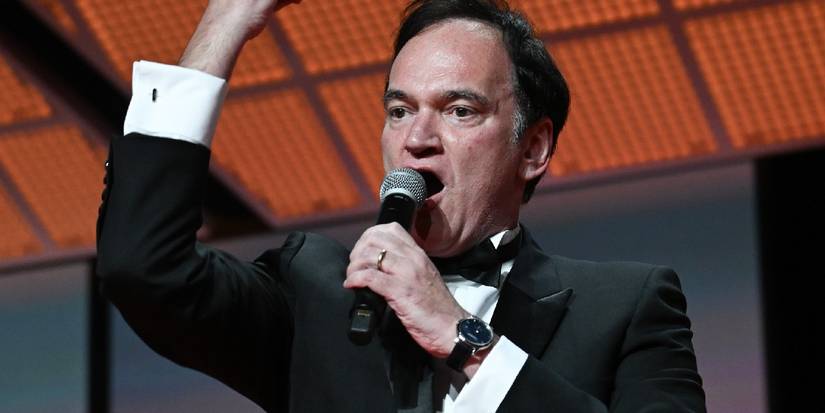It’s no surprise that two of the defining filmmakers of our time have strong opinions on the work of Alfred Hitchcock, but their takes couldn’t be more different. While the films of Christopher Nolan and Quentin Tarantino include some of the most acclaimed releases of the past three decades, the pair’s viewpoints diverge when it comes to Hitchcockian classics.
The influence of Alfred Hitchcock on modern cinema is undeniable, as movies like Rear Window, Vertigo, and Psycho laid the foundations for every mystery, horror, or psychological thriller that came after them. Neither Nolan nor Tarantino have ever been shy about speaking about their influences, so it makes sense that they’re both on record with some thoughtful takes regarding Hitchcock.
Christopher Nolan Is A Huge Fan Of Alfred Hitchcock
As a director known for his mastery of mystery, thrills, and groundbreaking filmmaking techniques, it’s understandable that Christopher Nolan would hold Alfred Hitchcock in incredibly high esteem. Films like Memento and The Prestige powerfully echo Hitchcock’s fascination with psychological unravelling and internal conflict.
While Nolan’s use of nonlinear storytelling techniques make him stand out in today’s movie landscape, Hitchcock was already experimenting with form in works like Rope. Nolan himself even shouted out the influence of Hitchcock’s visual language on Dunkirk in a 2017 interview with NPR:
“I wanted to produce a film that was almost entirely based on the language of suspense, which I think is the most visual of cinematic languages, which is why I think Hitchcock has always been held up as possibly the greatest director of all time. And what Hitchcock understood — and I’ve tried to emulate and really learn from — is that the audience can care about a character simply by virtue of what it is they’re trying to achieve onscreen in a physical sense, a task they’re trying to achieve.”
Nolan also pointed out his fondness of Hitchcock’s earlier movies in a discussion with Turner Classic Movies. Speaking about the 1938 mystery The Lady Vanishes, Nolan praised the more lighthearted and joyful side of Hitchcock that “everybody forgets about.” As a film filled with humor, glamour, and joy, Nolan said there’s more to Hitchcock than the suspense he’s traditionally associated with.
Quentin Tarantino Has Been A Vocal Critic Of Hitchcock’s Work
While Christopher Nolan has had nothing but kind words for Hitchcock, Quentin Tarantino is far more critical of his work and is one of the few voices who dispute his universal reverence. In an interview on Tom Segura’s YMH podcast, Tarantino explained his stance when he claimed he’s “not a Hitchcock guy.”
While Tarantino still agrees that Hitchcock was “one of the greatest directors who ever lived,” he still feels that the third act of many of his films often “peter out.” Tarantino believes that if Hitchcock’s 1950s movies were released in the ‘70s, he likely would appreciate him more, but “he’s held back by the times” and the Hays Code.
However, Tarantino was far more critical in an interview with The New York Times, where he expressed disdain for Hitchcock classics like Vertigo and North by Northwest, stating he doesn’t understand their popularity and that they’re “mediocre” compared to the other films from that era. This is a controversial statement considering these amount to some of the most acclaimed movies ever.
Tarantino has not been shy about sharing negative opinions about the final films of Hitchcock’s career, and it’s this late-career downturn that in part likely influenced his own decision to stop directing movies after his tenth feature film. Not one to mince words, Tarantino even called Hitchcock’s second-to-last movie, Frenzy, “a piece of trash.”
Hitchcock’s Influence Is Predictably More Obvious In Nolan’s Movies (But It’s In Tarantino’s Too)
In many ways, Christopher Nolan is the Hitchcock of modern times, as his influence is clear as day throughout his entire filmography. Whether it’s the dream-traversing heist antics of Inception or even the intense suspense of The Dark Knight trilogy, Nolan has taken many of the tenets of Hitchcockian cinema and applied them in modern filmmaking.
The influence of Hitchcock on Tarantino is more subtle, but it’s certainly still there. Like Hitchcock, Tarantino builds suspense through dialogue rather than action, and iconic scenes like Hans Landa’s interrogation at the beginning of Inglourious Basterds mirror the unnerving atmosphere of Norman Bates in Psycho’s parlor scene.
Hitchcock was one of the first filmmakers to manipulate audiences in a way that made them root for anti-heroes, con men, and villains. This ability to walk the fine line of moral ambiguity and social acceptability can be seen across Tarantino’s entire filmography and shows just how much he owes to the influence of a director he’s not particularly fond of.
Nolan and Tarantino are very different directors whose stylistic choices and impulses vary greatly, although no filmmaker works in a vacuum, and it’s inevitable that they will be influenced by the masters that came before them. While their personal opinions couldn’t be further apart, it’s impossible to make movies today without the influence of Alfred Hitchcock creeping in.
This story originally appeared on Screenrant



.JPG?q=49&fit=crop&w=825&dpr=2)